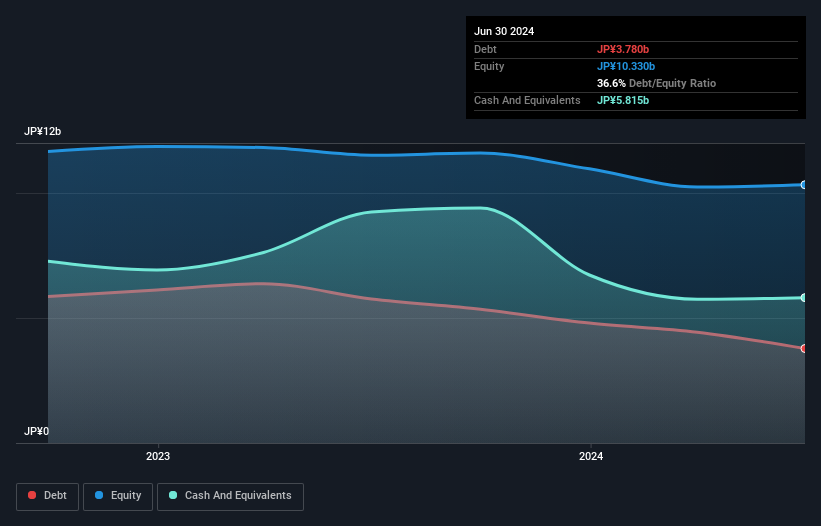
Warren Buffett famously said, 'Volatility is far from synonymous with risk.' When we think about how risky a company is, we always like to look at its use of debt, since debt overload can lead to ruin. We can see that Kufu Company Inc. (TSE:4376) does use debt in its business. But the more important question is: how much risk is that debt creating?
What Risk Does Debt Bring?
Debt is a tool to help businesses grow, but if a business is incapable of paying off its lenders, then it exists at their mercy. Ultimately, if the company can't fulfill its legal obligations to repay debt, shareholders could walk away with nothing. However, a more usual (but still expensive) situation is where a company must dilute shareholders at a cheap share price simply to get debt under control. Of course, debt can be an important tool in businesses, particularly capital heavy businesses. The first step when considering a company's debt levels is to consider its cash and debt together.
See our latest analysis for Kufu
What Is Kufu's Net Debt?
As you can see below, Kufu had JP¥3.78b of debt at June 2024, down from JP¥5.76b a year prior. However, it does have JP¥5.82b in cash offsetting this, leading to net cash of JP¥2.04b.

How Strong Is Kufu's Balance Sheet?
According to the last reported balance sheet, Kufu had liabilities of JP¥5.47b due within 12 months, and liabilities of JP¥1.65b due beyond 12 months. On the other hand, it had cash of JP¥5.82b and JP¥807.0m worth of receivables due within a year. So its liabilities outweigh the sum of its cash and (near-term) receivables by JP¥501.0m.
Given Kufu has a market capitalization of JP¥11.8b, it's hard to believe these liabilities pose much threat. But there are sufficient liabilities that we would certainly recommend shareholders continue to monitor the balance sheet, going forward. Despite its noteworthy liabilities, Kufu boasts net cash, so it's fair to say it does not have a heavy debt load!
It is just as well that Kufu's load is not too heavy, because its EBIT was down 72% over the last year. When a company sees its earnings tank, it can sometimes find its relationships with its lenders turn sour. When analysing debt levels, the balance sheet is the obvious place to start. But you can't view debt in total isolation; since Kufu will need earnings to service that debt. So if you're keen to discover more about its earnings, it might be worth checking out this graph of its long term earnings trend.
Finally, a company can only pay off debt with cold hard cash, not accounting profits. Kufu may have net cash on the balance sheet, but it is still interesting to look at how well the business converts its earnings before interest and tax (EBIT) to free cash flow, because that will influence both its need for, and its capacity to manage debt. Over the last two years, Kufu actually produced more free cash flow than EBIT. That sort of strong cash generation warms our hearts like a puppy in a bumblebee suit.
Summing Up
We could understand if investors are concerned about Kufu's liabilities, but we can be reassured by the fact it has has net cash of JP¥2.04b. The cherry on top was that in converted 173% of that EBIT to free cash flow, bringing in JP¥1.8b. So we are not troubled with Kufu's debt use. There's no doubt that we learn most about debt from the balance sheet. However, not all investment risk resides within the balance sheet - far from it. Be aware that Kufu is showing 3 warning signs in our investment analysis , and 1 of those is significant...
If, after all that, you're more interested in a fast growing company with a rock-solid balance sheet, then check out our list of net cash growth stocks without delay.
Valuation is complex, but we're here to simplify it.
Discover if Kufu Company Holdings might be undervalued or overvalued with our detailed analysis, featuring fair value estimates, potential risks, dividends, insider trades, and its financial condition.
Access Free AnalysisHave feedback on this article? Concerned about the content? Get in touch with us directly. Alternatively, email editorial-team (at) simplywallst.com.
This article by Simply Wall St is general in nature. We provide commentary based on historical data and analyst forecasts only using an unbiased methodology and our articles are not intended to be financial advice. It does not constitute a recommendation to buy or sell any stock, and does not take account of your objectives, or your financial situation. We aim to bring you long-term focused analysis driven by fundamental data. Note that our analysis may not factor in the latest price-sensitive company announcements or qualitative material. Simply Wall St has no position in any stocks mentioned.
About TSE:4376
Kufu Company Holdings
Through its subsidiaries, engages in the daily life related and life events related businesses.
Excellent balance sheet with acceptable track record.
Market Insights
Community Narratives



